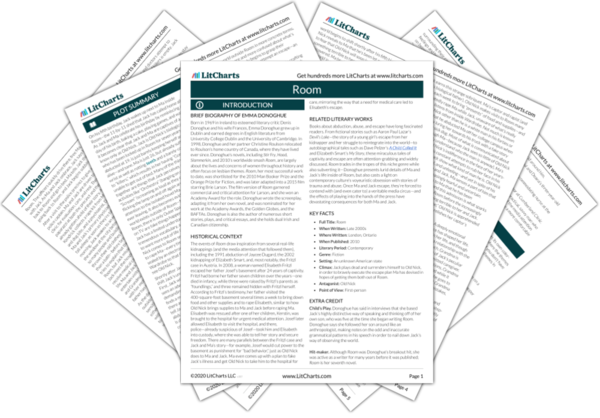One of the major symbols in Room is TV, which represents the changing way that the protagonists relate to the outside world. While Jack and Ma are imprisoned in Room, Jack believes that the entire world consists only of Room—everything outside of Room is Outer Space, and everything he sees on TV, from cartoons to the news to celebrity interviews, is “fake.” TV, then, is a complex symbol which evolves over the course of the novel. Though originally representative of Jack’s ignorance about the world, once Ma and Jack escape from Room, Jack’s ability to have learned so much about the world through TV instead becomes a symbol of his intelligence and Ma’s resourcefulness. Though Ma constantly warned Jack while they lived in Room that too much TV would “rot their brains” and dull their senses, TV actually serves to heighten Jack’s sensitivity to the world around him and allow him a way of understanding and empathizing with others in spite of his intensely sheltered upbringing. However, TV is also one of the main kinds of media that torment Ma and Jack after their escape; it’s on TV that Jack sees himself called a victim, and it’s after a traumatic TV interview that Ma attempts suicide. Though they eventually make a kind of peace with the media’s role in their lives, the way that TV effectively re-traumatizes both Ma and Jack represents the way that the outside world, though an invaluable source of wisdom and experience, can also be dangerous and unsympathetic.
TV Quotes in Room
Nothing makes Ma scared. Except Old Nick maybe. Mostly she calls him just him, I didn’t even know the name for him till I saw a cartoon about a guy that comes in the night called Old Nick. I call the real one that because he comes in the night, but he doesn’t look like the TV guy with a beard and horns and stuff.
“Listen. What we see on TV is... it’s pictures of real things.”
That’s the most astonishing I ever heard.
Ma’s got her hand over her mouth.
“Dora’s real for real?”
She takes her hand away. “No, sorry. Lots of TV is made-up pictures—like, Dora’s just a drawing—but the other people, the ones with faces that look like you and me, they’re real.”
“Actual humans?”
She nods. “And the places are real too, like farms and forests and airplanes and cities. . . ”
“Nah.” Why is she tricking me? “Where would they fit?”
“What’ll the person do with it?”
“Read it, of course.”
“TV persons can read?”
She stares at me. “They’re real people, remember, just like us.”
I still don’t believe that but I don’t say.
Ma does the note on a bit of ruled paper. It’s a story all about us and Room and Please send help a.s.a.p., that means super fast. Near the start, there’s two words I never saw before, Ma says they’re her names like TV persons have, what everybody in Outside used to call her, it’s only me who says Ma.
[Ma’s] walking with me up on her hip, I cling onto her shoulders. It’s dark but then there’s lights quick quick like fireworks.
“Vultures,” says Officer Oh.
Where?
“No pictures,” shouts the man police.
What pictures? I don’t see any vultures, I only see person faces with machines flashing and black fat sticks. They’re shouting but I can’t understand. Officer Oh tries to put the blanket over my head, I push it off.
“The malnourished boy, unable to walk, is seen here lashing out convulsively at one of his rescuers.”
“Ma,” I shout.
She doesn’t come. I hear her calling, “Just a couple more minutes.”
“It’s us. It’s us in TV!”
But it’s gone blank. Pilar is standing up pointing at it with a remote and staring at me. Dr. Clay comes out, he says mad things to Pilar.
“On again,” I say. “It’s us, I want to see us.”
“I’m terribly, terribly sorry—,” says Pilar.
“Intense interest from a number of networks,” Morris is saying, “you might consider doing a book, down the road...”
Ma’s mouth isn’t friendly. “You think we should sell ourselves before somebody else does.”
“He certainly seems to be taking giant steps toward recovery,” says the puffy-hair woman. “Now, you said just now it was ‘easier to control’ Jack when you were in captivity—”
“No, control things."
“You must feel an almost pathological need — understandably — to stand guard between your son and the world.”
“Yeah, it’s called being a mother.” Ma nearly snarls it.
“Is there a sense in which you miss being behind a locked door?”
Ma turns to Morris. “Is she allowed to ask me such stupid questions?”












